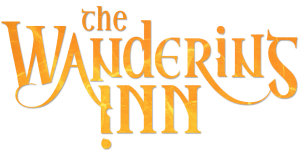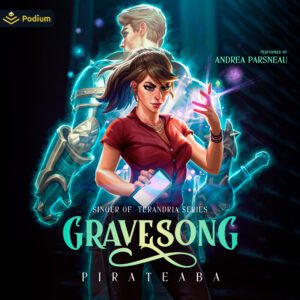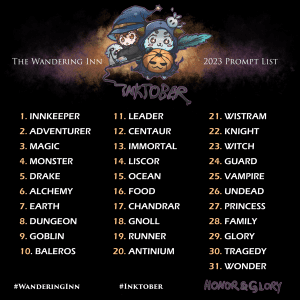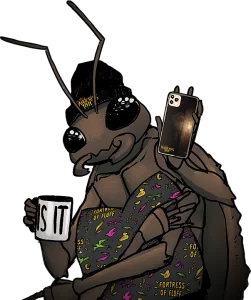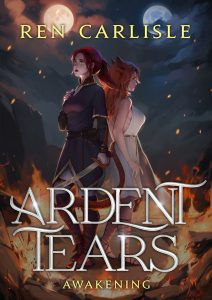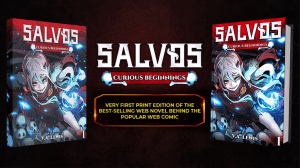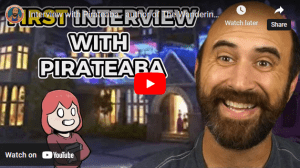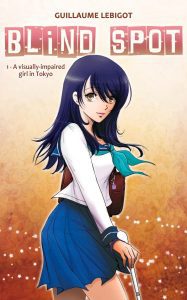This is me, pirateaba. Prefacing to say this is the editorial letter sent to me after the 8.11 E chapter. I wrote the chapter as I normally do over two days, livestreaming on Twitch (although one VOD was deleted and the other won’t last because Twitch doesn’t keep them), with readers providing typo-finding and some feedback.
That is my process. I posted the chapter to Patreon about an hour after finishing the chapter. Also, normal for web serials.
I don’t go through a strong revision process unless I feel something is really wrong, and I have not worked with an editor before. So it was a pleasure and uncertainty to hire a professional editor, Rebecca Brewer, and have them look at a chapter.
Since I had no idea what she’d make of the chapter, getting feedback is nerve-wracking. I had nightmares for three days before the chapter about being in school again or something. Never about actually writing, which is weird.
I had my birthday around writing the chapter, so I was relieved it felt strong; it could have been bad and a bad birthday gift from me to me. Like punching myself in the face. Also, I realized I have to do my taxes. (I still do, March is stressful). Stress became me, but as chapters went, 8.11 E the ‘first draft’ still feels like one of my better chapters.
With that said, I always do first drafts, so I feared a true editor used to polishing would sandpaper off my bad writing and the skin of my hands. V-verbally. Or in writing. Not literally.
Also, it’s a 28,000 word chapter so asking an editor to do that in what was about three days is why I offered a big reward for a contest. Yes, it’s a lot of money. But I am hoping to get the best in the business. Not paying $5000 (or more) for someone who hasn’t got a degree and years of experience!
The wait was still scary. However, I can now share the editorial letter she gave me (along with notes on the chapter) which I’ll be using to revise!
I’ll post the entire letter here, with some thoughts since it’s interesting. Editing is interesting. Here’s the letter:
Hello Pirateaba,
I’m so happy that I was able to work on this project with you! I rarely get to help with a story in such an immediate way. I was very impressed with your writing as well! I’m not sure how you’re able to write so well so quickly! Perhaps a pact with some sort of demon? Of course, I kid!
In the manuscript file you’ll see that I’ve turned on track changes so you can see the tweaks that I’ve made to the text itself. You can just go through my line edits and accept or reject any of my changes as you see fit. Because this chapter comes later in the story, you’ve solidified your voice and style. You might very well decide that you don’t like my suggested changes because it doesn’t fit your style, which is totally fine! My edits are merely suggestions.
Now, a little bit about how I go about editing a book: the way I think of it, I play your first and “dumbest” reader and I will point out areas that might trip up others. Of course, I’m at a disadvantage with prior knowledge compared to most of your readers, who have read all of your previous work. I read a few chapters scattered throughout The Wandering Inn including early stuff and late stuff, and researched characters online. In some instances, you might feel like the average reader will know stuff so you won’t need to tweak the chapter to answer those questions in the text.
I’ll also show you what I wanted at particular times as a reader. This might take the form of a question in the comments. That way, you can just make any changes in the manuscript that you think will help answer that for future readers.
Many of the comments will tell you my reactions at that point in the manuscript, and they are just there so you get a sense of a reader’s response. Though, you are already very lucky in that your fanbase is so invested and interactive. So few authors get that immediate reaction and discussion to their work!
Of course, some of my edits or suggestions on how to improve the story, might not be what you want to do. Instead, you can take my suggestion, and find another way to revise it that you prefer.
Now, time for my notes!
Beginning
First off, this was an excellent choice of chapter to bring a new editor in! Because Erin is starting from a new place, it made it easier for me to get into the story as well. Nicely done!
As a rule of thumb, I recommend people not staring a book, chapter or scene with someone waking up. Starting in media res (in the middle of a scene) tends to work better in getting things started quickly. However, it might work in this instance!
Does Erin literally wake up for the first time in the beginning of the chapter? If so, it would be the reader immediately picking up right where she left off. However, it seems like she might’ve been awake in that world for a few months before this. If this is the case, it might be more impactful to start off with something happening instead of her waking up. Perhaps you could start with her mother trying to get her to go to work?
At the beginning of this chapter, readers will have emotions about seeing Erin again. It seems like it has been a while, and she was “dead”! Dig into her emotions and reactions to things! What is her emotional reaction to not remembering things and then getting glimpses? Does she just brush it off or does her realization of the situation freak her out? This is such a weird situation for her to be in. Showing more of her reactions to things will make it easier for the reader to experience these things along with her.
Once we moved onto a different reset, it wasn’t clear to me if she remembered the other resets. When she realizes things are fake, does she suddenly remember the other resets?
Dialogue
I love how dialogue heavy your writing is! Personally that is what I gravitate to as well, and I think that is one of the reasons why your readers love this story so much. Dialogue really makes characters feel authentic, and you are particularly good at it.
However, I did notice that you don’t really use dialogue tags. Dialogue tags are the things that attribute the speech to a certain character, like “she said’. This might be a result of the way that you write in your head, or it could be a strong writing preference.
I would recommend putting some more dialogue tags in, particularly in scenes where multiple people are talking. However, if you don’t like dialogue tags, there are other ways to help the reader parse the dialogue and picture who is speaking.
For instance, you can include actions or descriptors of the speaker in the same paragraph as the dialogue. For instance, a paragraph could read:
Kasigna’s face turned wrathful. “He has no authority here. You would choose him over me? There is no choice here. Enough.”
Doing this gives description while also letting the reader know who the focus of that paragraph is, and who is speaking.
That same section could also read:
“He has no authority here. You would choose him over me? There is no choice here. Enough,” Kasigna said. Her wrath was evident.
As you go through my line edits, you’ll see that I tried to tweak paragraph breaks to better indicate who is speaking where. Don’t be afraid to have dialogue and descriptions in the same paragraph!
If you are in a scene where there are just two characters speaking, of course you won’t need to do these things as much. Readers will assume that the two characters are taking turns. However, if the scene has multiple people, you’ll want the reader to immediately be able to picture who is saying what.
Setting up scene
Especially later in this chapter, we get larger groups of people interacting. In those scenes the dialogue tags will be helpful, but you’ll also want to consider “establishing shots”. Think of it as a movie where we pan over a scene so that you know where we are and who is there. Whenever you’re starting a new scene, you’ll want to set it up. Clue the reader in on where they are at, and who is there. That way, there isn’t the surprise when a character we didn’t know was present starts to speak. (Of course, the exception being when you purposefully want to have a big reveal.)
Having these establishing shots will allow the reader to get a better picture of the scene in their head and get more immersed.
This was frequently an issue with me because I couldn’t quite picture Kasigna when she appears. Is she appearing in one body, or two or three?
Having establishing shots in scenes can also be very helpful in fight scenes!
Details
I also wanted to cover some small writing details. Of course, you’ll see small tweaks I’ve made throughout the manuscript, but I wanted to touch on these here. I try not to be too heavy handed with my changes for small things that the author might feel strongly about.
For instance, you tend to use the word “but” frequently. I didn’t want to just remove all of them because it might be something you really love. I would recommend doing a search in Word, and seeing how many uses of the word “but” could be removed. Some of them you will need to keep, some you will want to keep, and some you’ll be able to get rid of fairly easily. Sometimes this might mean you slightly rewrite the sentence.
Particularly towards the beginning, be wary of the overuse of “memory flooded”. It was something the struck me a few times.
You will see in the comments in my line edit that I’ll have written “intentional” at various points. This indicates that a sentence or word indicated something specific to me, that I wasn’t sure if you wanted that or not. Some times, that is exactly what you intended, but I like to point out those places where I thought that might not be the case.
You’ll also see “Rephrase?” in some comments. These are usually for sentences or paragraphs where the wording is such that it is hard to follow. Rephrasing it can hopefully help alleviate the confusion.
One thing that came to me was, when referring to the three forms of the shadow with Kasigna, would it make sense to capitalize Three? Calling them The Three would almost feel like a title and might make things more clear so you don’t confuse them with three other people.
Throughout, I’ve made tweaks to wording to make them more clear or concise in my mind. However, don’t feel like you have to accept all of my suggestions! It won’t hurt my feelings if you don’t take those edits. My goal is to help you while retaining your unique voice.
And with that, those are my notes! I do hope they are helpful. Of course, if you have any questions for me about what I meant at certain points, or if you wanted to ask questions about possible changes you are considering, I am more than happy to help! You can either email me or bring it up in our Discord chat.
Best,
Rebecca Brewer
Author’s Notes: That’s a great letter! I was worried, but that was a lot nicer than I expected it to be! Way nicer, in fact.
The fact that an editor can walk on and edit a chapter without knowing the story is also nice. In fact, it has some things going for it. If a chapter is so convoluted someone can’t follow it even without knowing all the plot details…there may be a problem.
With that said, I’d almost stand by the first line for emotional impact. But going more into having reactions and emotions is something I realized myself was lacking.
(As an aside, the notes have much more detailed comments and line-edits or whatever the term is. I’m just going off the letter here.)
Dialogue echoes a lot of reader’s points. I never add dialogue tags since I realized I hated them one day, but the confusion has struck Andrea, the audiobook reader, as well as readers. Sometimes the ambiguity is nice, but I more like the action-descriptor suggestion as a neat fix. Maybe I should try it going on? I don’t want to do dialogue tags, but I didn’t consider this.
Scenes–I am bad at these. And that’s a good point because my lack of descriptors does seem obvious…now someone points it out.
I use but a lot. I use even, paused, stared…it’s shorthand since I’m not stopping or going back to change it up. All those notes in those areas will be very helpful because uh, that’s the most basic problems a draft could fix.
Finally, what I like is that at no point do you see Rebecca tell me to cut the entire chapter down, as a lot of readers believed she would. She’s editing my writing style, not telling me it ‘has to be under 20,000 words’ for an arbitrary reason.
I’m going to revise based on her notes, go back and forth with her on any last changes, and then post the better chapter. If anyone’s curious, they can check the Patreon chapter and this one and see how the revision and editing make it different and hopefully better.
Thanks to Rebecca for the fast work too! If any other authors are curious, hopefully this was interesting to you too. Don’t be afraid of editors…unless you should be.
I dunno.
–pirateaba
